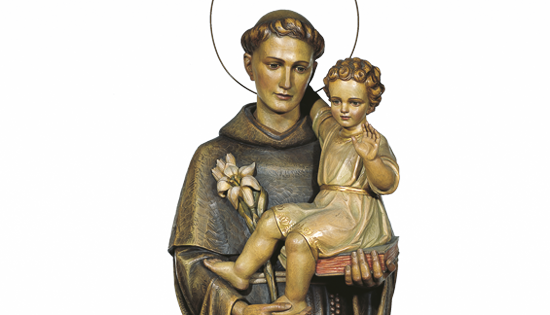The miracle
In Lisbon, the city where St. Anthony was born, there were two people who hated each other to death. One evening the son of one of them met the son from the rival family, which was living close to St. Anthony’s parents. Filled with hatred, and seeing that no one else was around, he stabbed the other young man to death.
He then buried the corpse in the garden of Anthony’s father. Martin, Anthony’s father, tried to prove his innocence, but the grisly evidence found in the family garden was enough to convict the poor man of the murder.
Just when things were at their worst, God revealed to Anthony, who was in Padua, the plight of his father. Immediately, the Saint obtained permission to go away for a night. The distance from Padua to Lisbon is approximately 1,200 miles, but Anthony was there in a couple of hours through divine intervention. In the court room the Saint asked that the body of the murdered man be produced immediately. Anthony approached the corpse and, in a firm voice, asked the man to tell who had killed him. To the amazement of all, the corpse sat up and clearly said the name of the murderer and attested the innocence of Anthony's father, who was freed at once. The revived man then turned to Anthony and asked absolution from his sins, then he died again. Miraculously, the next day the Saint was back in Padua. After all, he had asked permission to be away only over night.
Meditation
Anthony’s miracle testifies to a very important value: the sanctity of human life from conception (from the human embryo) to natural death.
Pope St John Paul II began his 1995 Encycical Evangelium Vitae, the Gospel of Life, with these words, “The Gospel of life is at the heart of Jesus’ message… to be preached with dauntless fidelity to the people of every age and culture” (EV 1). With these words, John Paul calls all of us to be faithful to the message of Jesus Christ on the sanctity of human life. We live in times in which there is a great cultural war between a culture of death and a culture of life. As Catholics we must have the courage to proclaim the culture of life for the common good of society. This is the duty and responsibility of all of us. Therefore, we must constantly, at every level, promote the dignity of the human person and the truth that all human beings are created in the image and likeness of God from the moment of their conception until natural death.

